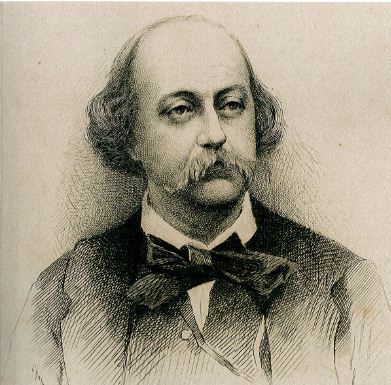Flaubert biographies
By ADRIAN TAHOURDIN

This is Flaubert, of
course, in a copy by Caroline Franklin-Grout of an etching by Eugène
Champollion. It adorns the cover of Michel Winock’s new biography of the
writer, published by Gallimard. Franklin-Grout was the writer’s niece.
In Flaubert’s Parrot, Julian
Barnes’s protagonist Geoffrey Braithwaite, a retired doctor, widower and
amateur Flaubert enthusiast, spends a chapter demolishing Enid Starkie’s
biography of the writer. He points out that in the first volume (1967), Starkie
chose as the “frontispiece” a portrait of “Gustave Flaubert by an unknown
artist”. “The only trouble is, it isn’t him. It’s a portrait of Louis Bouilhet
. . .”. Bouilhet was a minor poet and dramatist, and a contemporary and close
friend of Flaubert.
Braithwaite goes on to
say: “I once heard Dr Starkie lecture, and I’m glad to report that she had an
atrocious French accent” (Starkie taught at Oxford). In a chapter entitled “Emma
Bovary’s Eyes”, he quotes from the biography: “Flaubert does not build up his
characters, as did Balzac, by objective, external description; in fact, so
careless is he of their outward appearance that on one occasion he gives Emma brown
eyes (14); on another deep black eyes (15); and on another blue eyes (16)”.
Flaubert actually wrote:
“quoiqu’ils
fussent bruns, ils semblaient noirs à cause des cils . . .”, and later: “Vus de
si près, ses yeux lui paraissaient agrandis, surtout quand elle ouvrait
plusieurs fois de suite ses paupières en s’éveillant; noirs à l’ombre et bleu
foncé au grand jour, ils avaient comme des couches de couleurs . . . ”. (". . . brown eyes, but made to look black by their dark lashes . . . "; "Seen so close, her eyes appeared enlarged, especially when she blinked them open several times in succession on waking. Black in the shadow, and a rich blue in broad daylight, they seemed to hold successive layers of colour, , . . " Alan Russell's translation)
Hardly "careless".
The killer lines come at the end of the chapter: “All in all, it seems a magisterial negligence
towards a writer who must, one way or another, have paid a lot of her gas
bills”.
“Why write a biography
of Flaubert? One more . . . ”, asks Michel Winock in his preface. Winock claims
no expertise when it comes to Flaubert – he’s an intellectual historian – and
craves the indulgence of Flaubertians. Yet he relates how when he was studying at
the Sorbonne, he and his fellow students would wander over to the Luxembourg
Gardens where they’d recite whole passages from L’Éducation sentimentale to
each other.
Winock follows on the
heels of Geoffrey Wall's biography of 2001, which the TLS reviewer
Maya Slater described as “magnificently readable” if light on the work itself (October 10, 2001).
More recently, Frederick Brown published a 650-page Life in 2006, which the TLS reviewer Victor Brombert commended for its "impressive capacity for documentation", and its "literary flair and restraint" (September 1, 2006). Brombert points out that Brown has made "especially good use of the extraordinary letters that Flaubert wrote . . . ". See Julian Barnes's review of the fifth and final volume of the letters.
It remains to be seen whether
Winock has managed to come up with anything new, although he claims to bring a
historian’s perspective to bear. He has provided a “Petite anthologie” of
Flaubertian wisdom, from “Absolu” to “Vérité”: e.g. under Avenir: “L’avenir est
ce qu’il y a de pire, dans le présent” (1839); Gens de lettres: “Les gens de
lettres sont des putains qui finissent par ne plus jouir” (1852); Haine: “La
Haine est une vertu” (1872); Style: “Que je crève comme un chien plutôt que de
hâter d’une seconde ma phrase qui n’est pas mûre” (1852).
Winock's book will be reviewed in a future issue of the TLS.
Peter Stothard's Blog
- Peter Stothard's profile
- 30 followers



